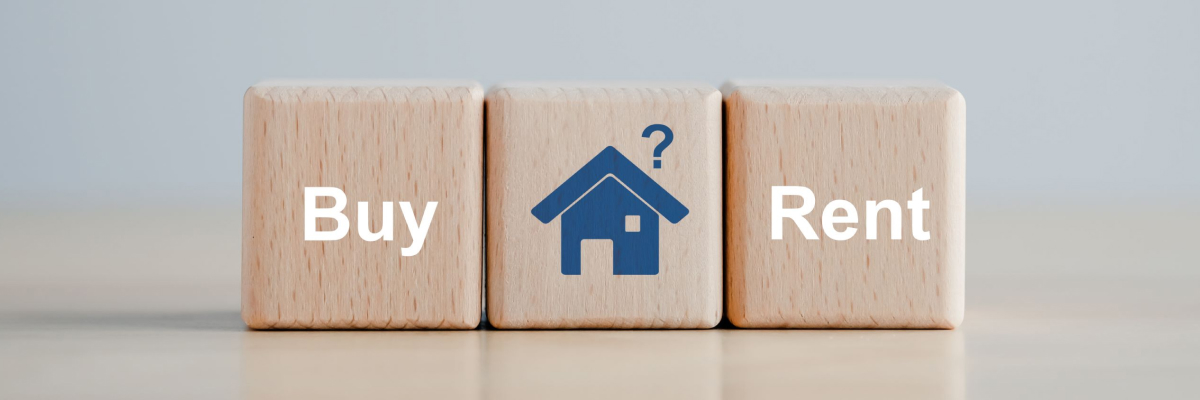Renting vs. Buying a Home: Which is Right for You?
Choosing between renting and buying a home is one of the biggest financial decisions you’ll ever make. While both options come with their own advantages and challenges, the right choice often depends on your personal circumstances, lifestyle preferences, and long-term financial goals. In this article, we’ll explore the key pros and cons of renting and buying a home to help you make the most informed decision.
The Case for Renting a Home
- Flexibility and Mobility
Renting offers greater flexibility, especially if you’re not ready to settle down in one place. For people whose jobs require frequent relocation or who enjoy the freedom of moving without being tied down, renting is a smart option. Lease agreements are typically short-term (6 to 12 months), giving you the freedom to move when needed.
- Lower Upfront Costs
One of the biggest advantages of renting is the lower upfront cost. While buying a home typically requires a down payment (often 10–20% of the home’s price), renters usually only need to pay a security deposit and the first month’s rent. This makes renting more accessible, especially for young adults or those still saving for a home.
- Fewer Maintenance Responsibilities
Home maintenance can be costly and time-consuming. When you rent, the landlord or property management company is typically responsible for repairs and upkeep. From broken appliances to leaky roofs, renters don’t have to worry about covering those unexpected costs.
- No Property Taxes or Market Risks
Renters are not responsible for property taxes or fluctuations in the housing market. You won’t lose money if home values drop, and you avoid the complexities of selling a home during a downturn.
The Case for Buying a Home
- Building Equity
Buying a home is an investment. With every mortgage payment, you build equity—ownership in your home. Over time, this can become a valuable asset, and if property values increase, your investment grows. Renting, on the other hand, provides no return on your monthly payments.
- Stability and Long-Term Security
Homeownership provides stability. You don’t have to worry about rent increases or being asked to leave. It’s your property, which means you can stay as long as you like, raise a family, or pass it down to future generations.
- Personalization and Freedom
Owning a home means you can truly make it your own. Paint the walls any color, remodel the kitchen, or add a backyard garden—you’re free to personalize the space however you choose. Renters often face restrictions on decor and modifications.
- Tax Advantages
Homeowners can benefit from a variety of tax breaks, including deductions on mortgage interest and property taxes. These tax benefits can offset some of the costs of ownership and help you save money over time.
Key Questions to Ask Yourself
Before deciding between renting and buying, ask yourself the following:
- How long do I plan to stay in this area?
If you plan to stay for less than 3–5 years, renting may be the better financial move. Buying makes more sense if you’re settling down for the long term.
- Do I have enough saved for a down payment and closing costs?
Buying a home involves significant upfront expenses, including the down payment, closing costs, moving expenses, and potential repairs.
- What’s my credit score and debt situation?
Mortgage approval depends on your credit history and current debts. Renting may be the better option if your credit needs improvement.
- Am I ready for the responsibilities of homeownership?
Owning a home means you’re responsible for maintenance, property taxes, insurance, and more. Make sure you’re prepared for the commitment.

Renting vs. Buying: A Financial Comparison
Let’s say you’re comparing a $1,500 monthly rent vs. buying a home for $250,000 with a $50,000 down payment and a 30-year mortgage. While the monthly mortgage may be comparable to rent, ownership comes with added costs like insurance, maintenance, and property taxes. However, over time, the equity you build can lead to significant wealth.
On the other hand, if the housing market is overpriced or you’re uncertain about your job stability, renting could protect you from financial risk.
Which is Right for You?
There’s no one-size-fits-all answer. Renting is often best for those seeking flexibility, lower upfront costs, and fewer responsibilities. Buying makes sense for people who want long-term stability, investment potential, and the freedom to make a house their own.
Your decision should reflect your financial situation, lifestyle goals, and long-term plans. Take the time to crunch the numbers, consider your future, and weigh the pros and cons before making your move.
Morse Moving & Storage: Best Movers in Grosse Pointe
When it comes to moving companies in Grosse Pointe, Morse Moving & Storage stands out for our commitment to reliability, professionalism, and customer satisfaction. With decades of experience serving the local community, we understand the unique needs of Grosse Pointe residents and tailor our services to make every move smooth and stress-free. Whether you’re moving across town or planning a long-distance relocation, our team is here to handle every detail with care and precision.
As trusted Grosse Pointe movers, we offer a full range of moving and storage solutions designed to fit your timeline and budget. From packing and loading to transportation and secure storage, we’re dedicated to making your moving experience as seamless as possible. Choose Morse Moving & Storage for friendly service, expert movers, and the peace of mind that comes from working with a local company that truly cares.
Your Smooth Move Begins Now
If you’re planning a move, Morse Moving & Storage is here to make it simple. Our experienced team handles everything with care, so you don’t have to stress. We offer reliable, professional service tailored to your needs. Reach out today for a free quote and let us help you move with confidence.

![]()
![]()
![]()











